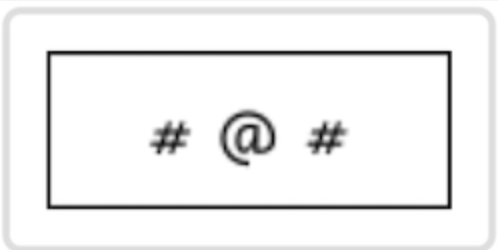 Korn Ferry Assessment 2025: Examples & Prep for Any Test
Korn Ferry Assessment 2025: Examples & Prep for Any Test
If you're about the take one of the Korn Ferry / Talent Q tests, you probably know that they are known for being tricky and difficult - their personality and leadership tests are known for being very complex and confusing, and their cognitive tests require a lot of practising and preparation.
To ensure you are prepared for any Korn Ferry assessment ahead of you, we have developed a Korn Ferry PrepPack, which includes practice tests, answer explanations, and detailed score reports.
See What Makes the Korn Ferry Assessment a Game-Changer!
What is Korn Ferry Assessment?
Korn Ferry assessments are a set of exams designed to assess the suitability of candidates and employees for a specific role by evaluating their skills and characteristics. These tests are divided into two categories:
-
Personality tests - assess an individual's traits, behaviours, objectives, and motivations. The Korn Ferry Personality tests include Leadership Potential Assessments (KFALP, KF4D,viaEDGE) and the Talent Q Dimensions personality test.
-
Cognitive tests - assess an individual's cognitive abilities and their proficiency in numerical, verbal, and logical problem-solving. Korn Ferry cognitive ability tests are also known as Talent-Q Elements and Aspects tests.
In 2014 Korn Ferry acquired the assessment company Talent Q, and since then, all the tests that used to be provided by Talent Q are now provided by Korn Ferry.
Keep reading below for more in-depth information about those 2 test categories and practice sample questions. You can also take a full Korn Ferry / Talent Q Practice Test.
Korn Ferry is a management consulting firm and part of Hay Group. Since 2014, Talent Q tests have been administered by Korn Ferry. If so, since the term Talent Q tests mainly refer to the cognitive aptitude tests provided by Korn Ferry, while the term Korn Ferry tests refers to their behavioural and leadership tests.
One of the reasons that Korn Ferry tests are popular as recruitment tools are that the tests are adaptive. This means that the tests will be challenging, but if the questions take too long to answer or if you get them wrong, an easier question will be presented next. If so, the answer to this question depends on your performance - the better you'll be, the harder the test will become.
Usually, it takes 3-4 weeks to see the test's results. You should return or log in to your Korn Ferry Assessment Dashboard (homepage). Any outstanding assessments are listed in Section 2 of the Dashboard. If nothing is listed here, you have completed all assessments assigned for this assessment campaign. All completed assessments are listed in Section 3 of the Dashboard.
Many different companies across the spectrum of industries use Korn Ferry’s assessment tests as part of their recruitment process, such as:
The Korn Ferry Leadership assessments, personality tests and psychometric tests do not have a pass or fail mark. Instead, it is up to the individual employer to set the scoring criteria.
Korn Ferry Cognitive Ability Tests
Korn Ferry cognitive ability tests, also known as Talent-Q tests, are online assessments designed to evaluate a wide range of cognitive abilities and personality traits relevant to job performance. Organisations widely use it to assess the potential of their employees and make informed talent management decisions.
The Talent Q assessments consist of a series of tests that measure abilities such as numerical, verbal and inductive reasoning, as well as personality traits such as motivation, adaptability, and leadership potential. These are usually given as a group of tests- either the Talent Q Elements Test (numerical, verbal, personality and logical reasoning tests) or the Talent Q Aspects Test (numerical, logical, personality and checking ability tests).
Here are some sample questions so you'll be able to see what it is all about-
Talent Q Numerical Reasoning Sample Questions
Review the following tables:
Employees per sector in the UK
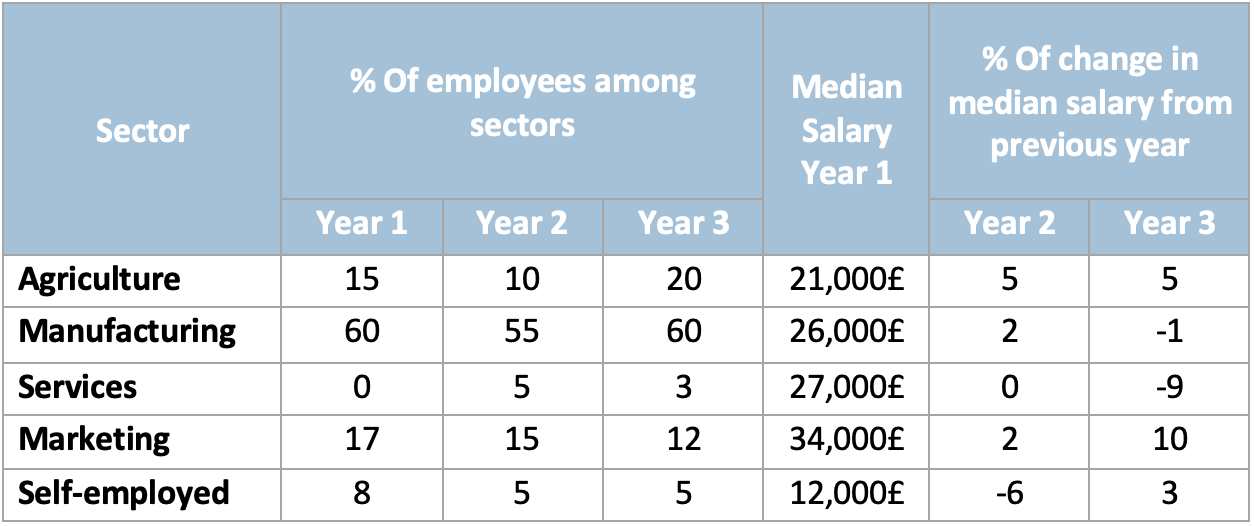
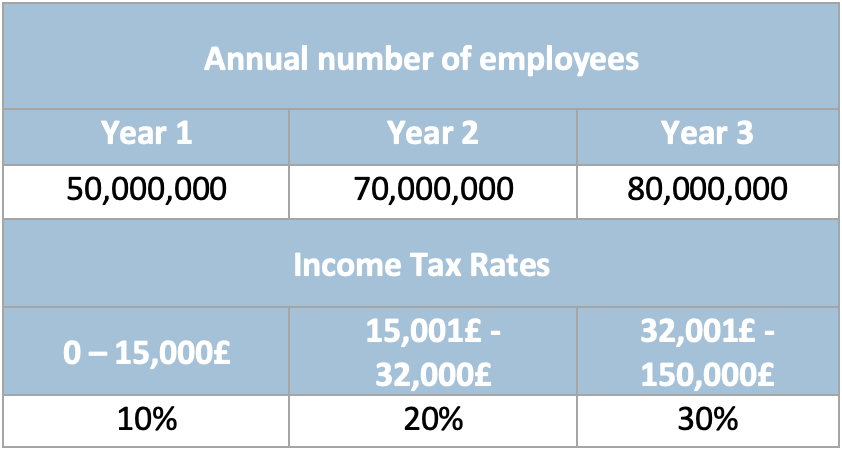
Assume the tax rate applies to the entire salary.
1. In which sector did the number of employees increase the most from year 1 to year 2?
Talent Q Logical Reasoning Sample Questions
Please identify the answer that completes the logical sequence matrix:
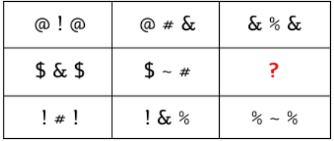
Which of the following can replace the question mark?
Talent Q Verbal Sample Questions
Read the following passage and answer the question below:
Labour Crisis
A prolonged labour market recession is in the making, as long-term unemployment is on the rise, and many workers are becoming excluded from the labour market. The shift to austerity measures has further deteriorated conditions of labour markets in countries hit by the debt crisis. The depressed employment situation has been accompanied by growing job precariousness for those who have a job. The incidence of part-time work has risen significantly, as has that of temporary employment.
Given the significant slowdown in economic growth, job loss can increase severely as businesses decrease expenditure, thus leading to higher unemployment. At the same time, the crisis has resulted in the contraction of bank credit for small and medium-sized businesses and this, in turn, has reduced the growth in self-employment.
Measures that will increase employment and speed up economic growth should be taken promptly. Given the impossibility of financing expenditures with deficits, one can realistically suggest budget-neutral increases in training programmes and subsidies to businesses. This must be coupled with government programmes to facilitate credit to small- and medium-sized businesses, financed with increases in taxes in other areas such as environmental or tourist taxes that will not distort the economy adversely.
Adapted from europa.eu
Which one of the following is NOT given as a cause of the labour market recession?
The Korn Ferry Assessment Online Preparation
Our experts have researched and perfected an online practice pack designed to mock the challenges you'll face in the Korn Ferry / Talent Q tests.
Realistic Simulations
Practice questions mirroring those you will face in the KFALP and the KF4D exams.
Ready for Every Scenario
Elaborated guides, written by assessment center experts.
Personalized for Your Best Score
Identify weak areas to focus your practice for the best score.
Available for only £49, you can ensure the high score you deserve and unlock your potential.
Korn Ferry Leadership Assessments
Korn Ferry offers a range of leadership assessments that measure a variety of skills and qualities, including emotional intelligence, strategic thinking, and executive presence. These tests are designed to provide a comprehensive evaluation of an individual's leadership strengths and areas for improvement.
Korn Ferry Assessment of Leadership Potential (KFALP)
The KFALP is a personality questionnaire that includes three main sections: a background section, drives, and work style and preferences. It is often used with an additional cognitive test called a Raven APM (advanced progressive matrices) section. You can answer Raven's Example Questions to gain an idea of what these look like.
Korn Ferry Four-Dimensional Assessment (KF4D)
The KF4D assesses candidates’ leadership and work-related behaviours, using various ranking formats (ranking lists, choosing cards, and answering individual statements). Questions require ranking your competencies, characteristics of past experiences and personal motivations. It is also called the “Korn Ferry Unsupervised Internet Test” or Korn Ferry UIT.
Korn Ferry Dimensions Test
The Korn Ferry Dimensions Questionnaire measures personality characteristics in three main domains: People and Relationships, Tasks and Projects, and Drives and Emotions. It is often administered with the Korn Ferry cognitive tests. This test has two versions: the long version has 40 questions that take about 25 minutes to complete, and the short version has 13 questions and takes about 8 minutes to complete.
Let's take a look at some sample questions from our PrepPack, which simulates the questions in the KFALP and KF4D tests:
Job Profile Question
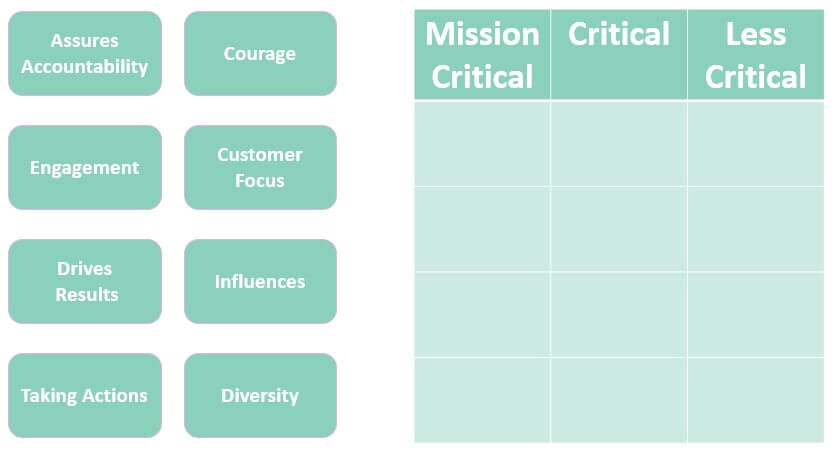
Job Analysis Question
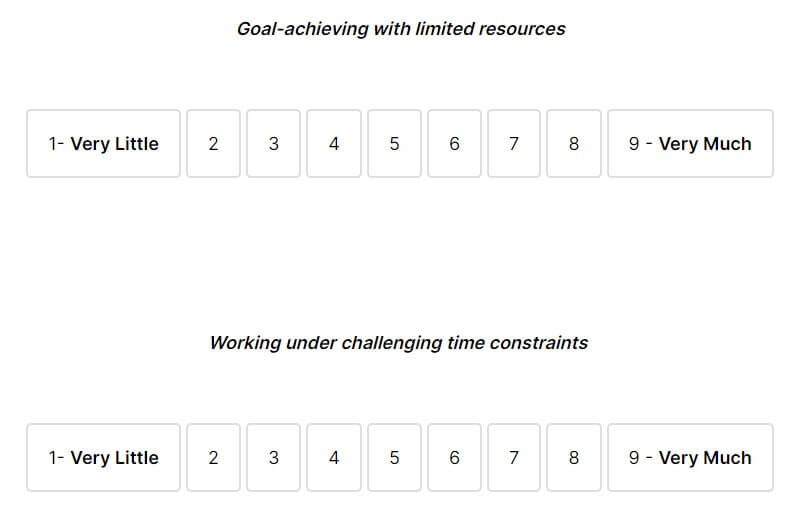
How to Pass the Korn Ferry Assessment: 7 Tips to Help You Prepare
The Korn Ferry assessments are highly regarded for their ability to evaluate an individual's leadership potential and capability. To excel in these assessments, it's important to prepare adequately. Here are 7 tips to help you pass the Korn Ferry assessments with confidence:
- Familiarity - Get familiar with the format and types of questions to expect.
- Mindfulness - Enhance your emotional intelligence and self-awareness.
- Analytical Thinking - Improve your strategic thinking and problem-solving abilities.
- Cognitive Skills - Practice your logical, verbal, mathematical, and interpersonal skills.
- Introspection - Prepare responses to behavioural questions that highlight your leadership experience and qualities.
- Relaxation and Preparation- Practice taking practice tests to build your test-taking skills and increase your comfort level and reduce your anxiety.
- Sleep well - Stay relaxed and confident on the day of the test by getting enough sleep and doing light exercises to clear your mind.

